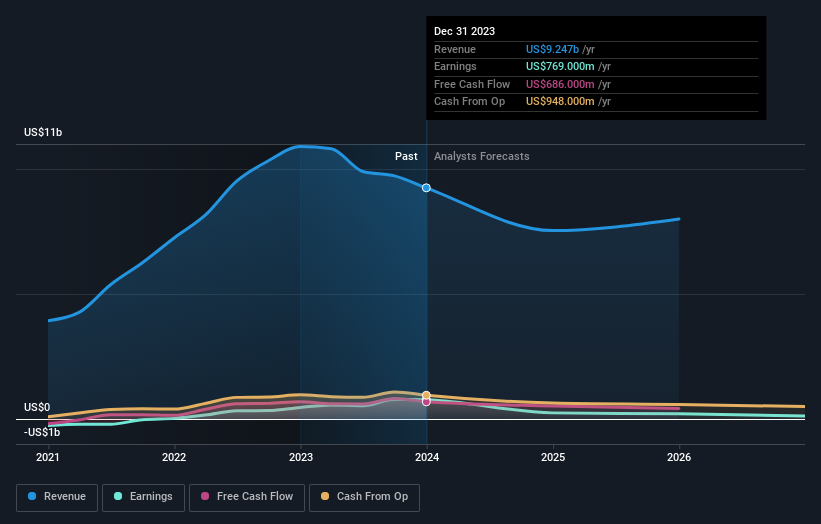Results: CVR Energy, Inc. Beat Earnings Expectations And Analysts Now Have New Forecasts
Last week, you might have seen that CVR Energy, Inc. (NYSE:CVI) released its full-year result to the market. The early response was not positive, with shares down 4.6% to US$33.43 in the past week. The result was positive overall - although revenues of US$9.2b were in line with what the analysts predicted, CVR Energy surprised by delivering a statutory profit of US$7.65 per share, modestly greater than expected. Following the result, the analysts have updated their earnings model, and it would be good to know whether they think there's been a strong change in the company's prospects, or if it's business as usual. So we collected the latest post-earnings statutory consensus estimates to see what could be in store for next year.
View our latest analysis for CVR Energy
Following the recent earnings report, the consensus from four analysts covering CVR Energy is for revenues of US$7.54b in 2024. This implies a not inconsiderable 19% decline in revenue compared to the last 12 months. Statutory earnings per share are forecast to tumble 68% to US$2.43 in the same period. Before this earnings report, the analysts had been forecasting revenues of US$8.25b and earnings per share (EPS) of US$1.63 in 2024. Although the analysts have lowered their revenue forecasts, they've also made a considerable lift to their earnings per share estimates, which implies there's been something of an uptick in sentiment following the latest results.
The consensus has made no major changes to the price target of US$31.60, suggesting the forecast improvement in earnings is expected to offset the decline in revenues next year. The consensus price target is just an average of individual analyst targets, so - it could be handy to see how wide the range of underlying estimates is. The most optimistic CVR Energy analyst has a price target of US$37.00 per share, while the most pessimistic values it at US$25.00. This shows there is still a bit of diversity in estimates, but analysts don't appear to be totally split on the stock as though it might be a success or failure situation.
Taking a look at the bigger picture now, one of the ways we can understand these forecasts is to see how they compare to both past performance and industry growth estimates. These estimates imply that revenue is expected to slow, with a forecast annualised decline of 19% by the end of 2024. This indicates a significant reduction from annual growth of 13% over the last five years. By contrast, our data suggests that other companies (with analyst coverage) in the same industry are forecast to see their revenue grow 1.5% annually for the foreseeable future. It's pretty clear that CVR Energy's revenues are expected to perform substantially worse than the wider industry.
The Bottom Line
The biggest takeaway for us is the consensus earnings per share upgrade, which suggests a clear improvement in sentiment around CVR Energy's earnings potential next year. On the negative side, they also downgraded their revenue estimates, and forecasts imply they will perform worse than the wider industry. Even so, earnings are more important to the intrinsic value of the business. There was no real change to the consensus price target, suggesting that the intrinsic value of the business has not undergone any major changes with the latest estimates.
With that said, the long-term trajectory of the company's earnings is a lot more important than next year. We have estimates - from multiple CVR Energy analysts - going out to 2025, and you can see them free on our platform here.
You should always think about risks though. Case in point, we've spotted 3 warning signs for CVR Energy you should be aware of, and 1 of them doesn't sit too well with us.
Have feedback on this article? Concerned about the content? Get in touch with us directly. Alternatively, email editorial-team (at) simplywallst.com.
This article by Simply Wall St is general in nature. We provide commentary based on historical data and analyst forecasts only using an unbiased methodology and our articles are not intended to be financial advice. It does not constitute a recommendation to buy or sell any stock, and does not take account of your objectives, or your financial situation. We aim to bring you long-term focused analysis driven by fundamental data. Note that our analysis may not factor in the latest price-sensitive company announcements or qualitative material. Simply Wall St has no position in any stocks mentioned.

